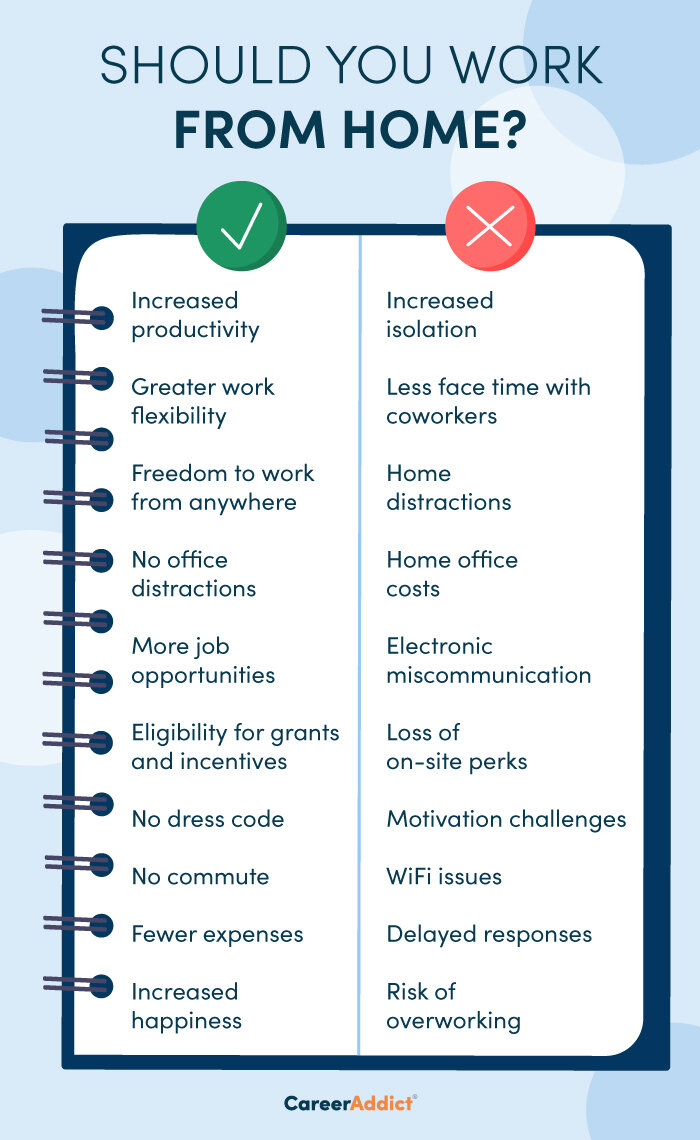Although the concept of working from home has been around for decades, it wasn’t until the acceleration of digital transformations and technological advancements of the mid-2000s that it really started to gain steam.
And when the world was brutally hit by the COVID-19 pandemic in 2020, remote work became an overnight standard, as companies around the globe were forced to quickly mobilize their workforces from office-based to home-based working. For some companies, the move was only temporary; for many others, it was a permanent shift.
Whatever the case, there’s no denying that working from home is here to stay.
But is it all that it’s cracked up to be?
Whether you currently work from home, you’re considering transitioning to a remote job or you’ve decided to set up your own home business, join us as we weigh up the pros and cons of working from home, and find out if it’s the right arrangement for you.

The pros of working from home
Let’s start by looking at some of the advantages of working from home:
1. You’re more productive
Several studies over the past couple of years, and even before the COVID-19 outbreak, show that those who work from home are more productive than their on-site counterparts.
Indeed, remote workers spend 10 minutes less a day being unproductive and work one more day per week, according to talent solutions firm Apollo Technical, while a survey by Connect Solutions found that teleworking can increase productivity by up to 77%.
2. You’ll have greater flexibility in your schedule
Whether you need to run to a doctor’s appointment or pick up your kids from school, a remote job will give you a lot of flexibility in managing all your responsibilities and obligations outside of work.
Of course, this will largely depend on your company’s remote work policy. You may have complete freedom over setting your own schedule or there may be an overlap of a few hours where the entire team is required to be online at the same time.
3. You can work from anywhere
You’re often not restricted to your home office when it comes to remote work.
Indeed, many companies allow employees to work from anywhere they want, be it a coworking space, a library, or even the coffee shop down the road.
You can even become a digital nomad and work while traveling to faraway destinations.
4. You eliminate office distractions
If you prefer working in a quiet and private setting, then a remote job will be ideal. In fact, you can say “goodbye” to all those office distractions, like ringing phones, noisy office equipment, chatty and otherwise difficult coworkers, and pointless meetings that could’ve been an email.
As an immediate result of eliminating all these distractions and interruptions, your focus will dramatically improve — and so too will your work efficiency.
5. You have access to more job opportunities
As remote work has now become more widespread, which has resulted in an increase of job openings in industries like education, finance, media, tech and even healthcare, you have access to a whole new range of job opportunities — both locally and globally.
Teleworking, meanwhile, also provides more job opportunities for people with disabilities who are unable to travel to an office or work long hours.
6. You might be eligible for grants and incentives
As a remote worker, you can take advantage of many government-offered grants and incentives. For example, if you have your own home business, you might be able to claim a home-office tax deduction.
Meanwhile, many cities and states across the US have set up various incentive programs in a bid to attract remote talent to those areas. The state of Maine, for example, will help pay off your student loan through the Opportunity Maine Tax Credit program, while Tulsa, Oklahoma will give you $10,000 in cash as part of the Tulsa Remote program.
7. You can wear whatever you want
Most workplaces require employees to follow a strict dress code policy, whether that’s wearing professional business attire or a corporate uniform.
When you work from home, though, you can wear pretty much whatever you want and stay cozy and comfortable in your sweats — or even your pajamas. (Just make sure to put on something a little more appropriate for those video calls!)
8. You skip the commute
A US Census Bureau report found that the average one-way commute time for American workers was 27.6 minutes — or 55.2 minutes in total. That equates to 239.2 hours every year.
When you work from home, you’re able to reclaim those 239.2 hours wasted on taking the bus or driving to work, and put them to better use — whether it’s spending more time with family, getting a workout in, taking up a new hobby, or getting some extra sleep in the morning.
9. You save money
Working from home means you’ll have fewer expenses to worry about.
In fact, when you eliminate the costs of commuting (like gas or public transportation), eating out, work clothes, and even childcare, you end up saving about $4,000 — or more — every year by working remotely, according to FlexJobs research.
10. You’ll be happier
Working from home increases your happiness by 20%, according to a Tracking Happiness study. The study also found a significant correlation between work happiness and overall life happiness, with 1,095 respondents rating their happiness at work as a 7 out of 10 and their happiness in life as a 9.
The cons of working from home
Although working from home has many advantages, there’s also a flip side to it. Here are some of the cons to consider before transitioning to a remote job:
1. You can feel isolated
One of the biggest disadvantages of teleworking is that it comes with an increased sense of isolation and loneliness, as you will spend most — if not all — of your workday by yourself without any social interactions. This can lead to all sorts of issues, including lowered productivity and a heightened risk of depression.
The key here is to regularly schedule outings with family and friends, join local clubs and meetups, and attend any team events the company organizes.
2. You’ll have less face time with your coworkers
When you work from home, you won’t have many — if any at all — face-to-face interactions with your coworkers. This might be ideal if you’re an introvert like me, but it can hinder effective collaboration and lead to an absence of a sense of community.
Digital communication tools will be helpful here, and it’s imperative to arrange regular video calls with your team to make up for the lost face time that you’re missing.
3. You’re exposed to distractions at home
Although you won’t have to worry about the many distractions of an office, working from home comes with its own host of distractions — whether it’s neighborhood activity, household chores, children demanding your attention, or dealing with pets — like your cat constantly trying to nap on your laptop.
All these distractions can affect your concentration and productivity, but the good news is that this can be avoided with a good pair of noise-canceling headphones and a private workspace.
4. You’ll spend more money on home office expenses
A great chunk of that $4,000 you save every year by working from home will go towards paying for equipment like headsets, monitors and software to perform your job, as well as furniture like a desk and a chair. And then there’s the increased gas and electricity costs associated with spending more time at home.
Though many employers will often offer stipends or reimbursements for these additional costs, you might be responsible for paying everything yourself — especially if you go over your allocated budget or allowance.
5. You might misread electronic communication cues
As remote jobs are reliant on electronic communication like email, text, social media and chat, you won’t see your coworkers’ body language and facial expressions to “read” their tone — and vice versa. This can result in misreading communications, which itself can lead to all sorts of misunderstandings and unnecessary conflict.
As a result, you’ll need to put in extra effort here to ensure your communications are positive and professional at all times.
6. You miss out on on-site perks
If you work for a company that offers various on-site employee perks, like free chef-made lunches or access to the company gym, you won’t be able to enjoy them if you work from home. Even swinging by the kitchen for a donut or a piece of birthday cake becomes a thing of the past.
7. You might struggle with keeping yourself motivated
Teleworking requires a great deal of self-discipline and self-motivation, which can be challenging to maintain in the long run.
With no one to directly supervise you or to answer to, It can be difficult to get up and do the same thing day in, day out. And before you know it, you’re constantly running late for meetings, missing deadlines, sleeping in, taking the day off or even surfing the web while on the clock.
8. Your WiFi might act up
Working from home carries the risk of iffy WiFi. You might have slow internet (or none at all) in specific rooms, or you might experience random dropouts throughout the day — issues that don’t generally occur when you’re in an office, where speeds and connectivity are far more reliable. This will, in all likelihood, result in frequent angry outbursts on your part, not to mention that you’ll likely have to work back the time you lost.
If you do have trouble with your WiFi, it’s generally a good idea to speak to your internet provider about upgrading your plan, or even change providers altogether.
9. You could be waiting for a long time for a response
Got a question or an urgent request? When you’re in an office, you can get the information you need generally right away — all you have to do is ask your cubicle mate or walk over to your supervisor’s office. But when you’re at home, you often have to wait the next hour — or sometimes the entire day — for a response, and this will cause all sorts of delays in your work.
10. You might be tempted to overwork
Working from home carries a risk of working longer than what you’re contractually obligated to, as you’re more likely to “lose track of time” and even be tempted to check your emails over the weekend. Indeed, a Nature Human Behaviour study found that remote workers spent 10% longer (or four or more hours) logged in each week.
Working overtime can ultimately lead to exhaustion and burnout, if left unchecked. The trick here is to set — and follow — a clearly defined schedule and clock on and off at certain times of the day.
Key takeaways
To sum up, here’s everything we learned about the practicality and reality of working from home:
- There are many advantages of working from home, including increased productivity and satisfaction, a lack of a formal dress code, and decreased daily expenses.
- On the flip side, it can be isolating and you could be tempted to overwork, while you’ll miss out on on-site perks and misread cues via electronic communications.
- Most downsides to working from home, though, can be overcome by finding appropriate solutions. For example, regularly arranging to meet family, friends and coworkers can help alleviate feelings of loneliness and isolation.
Can you think of any other pros and cons of working from home? Let us know in the comments section below.


